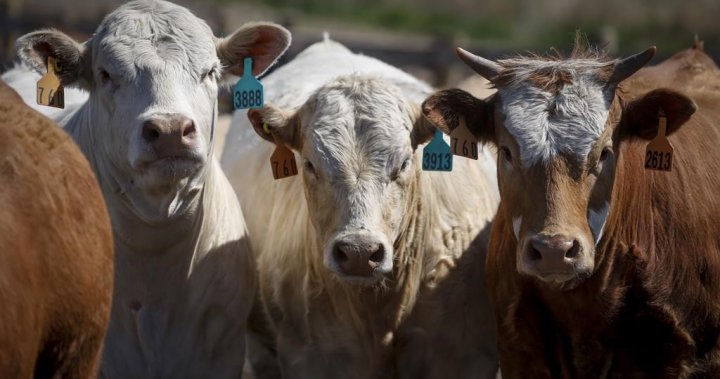WARNING: Some of the details in this story may be disturbing.
Kinia Romanowska has lived in Edmonton’s Sweet Grass neighbourhood for the past eight years.
Recently, she’s noted several coyote sightings. She says the animals have gotten more comfortable living in the area.
“There was a coyote family moving from cul-de-sac to cul-de-sac. A mother with her pups. One time I was sunbathing in my backyard and a pup just ran in despite me having a fence. We’ve had pairs of coyotes come to my house window,” Romanowska explained.
After a gruesome discovery last weekend, she says action needs to be taken.
Romanowska was walking in the neighbourhood with her son when they found body parts of a dead cat scattered across the grass.
“You could tell the cat had struggled. You can tell it was not a peaceful passing,” she said.
“The way the remains were found, it’s typical of coyote behaviour,” she added.
Romanowska fears there may be more pets killed, following an attack two years ago involving her neighbour’s dog. She fears the coyotes may become more aggressive and is concerned about how comfortable they’ve become roaming the area.

Get breaking National news
For news impacting Canada and around the world, sign up for breaking news alerts delivered directly to you when they happen.
“We had a coyote attack at the mouth of our cul-de-sac where a coyote attacked two dogs, bit one dog in the butt and snarled,” she explained.
“I mean, typically, I know they won’t attack children but we moved to a cul de sac in a community like this to know that our kids could play as they age. Now I’m wondering how aggressive (the coyotes) would get,” she added.
Colleen Cassady St. Clair is a professor of biological sciences at the University of Alberta. She has studied human-wildlife conflict for the past 15 years and leads the Edmonton Urban Coyote Project.
St. Clair says she’s not surprised a cat died from a coyote attack, noting the multiple sightings in Edmonton’s southside.
“Unfortunately cats are often targets of attacks by coyotes. Coyotes see cats as easy prey. And this time of year they might even use cats as a way to teach their young how to hunt,” St. Clair explained.
St. Clair partners with the city of Edmonton to promote wildlife education.
“Our city adopts an attitude of co-existence when possible, trying to teach people how to be safe around coyotes,” she explained.
St. Clair advises homeowners to take a proactive approach by removing coyote attractants. That includes removing garbage and compost, removing fallen fruit, sealing up cracks under sheds and staircases, and recommending residents install motion-activated lighting.
If that doesn’t work, and people come into close contact with coyotes, St. Clair says, residents will need to use behavioural techniques such as aversive conditioning or “hazing.”
“Shout at them, run towards them, throw things at them.”
Romanowska says she reported the latest incident to the city.
While the City of Edmonton could not confirm the incident, it said in most cases park rangers are dispatched to investigate.
If there are multiple encounters, there may be lethal removal of wildlife.
“Relocation of coyotes doesn’t work well. Studies have shown that those coyotes usually die in their new location,” St. Clair said.
Romanowska typically is in favour of living alongside wildlife. However, in this particular case, she wants the animals removed.
“That was a moment where ‘okay this is not just a wildlife sighting, this is invasive,’” she explained.
“The city needs to take an approach and we also need to deal with what happens in our neighbourhoods but we have to work hand in hand,” she added.
© 2024 Global News, a division of Corus Entertainment Inc.




